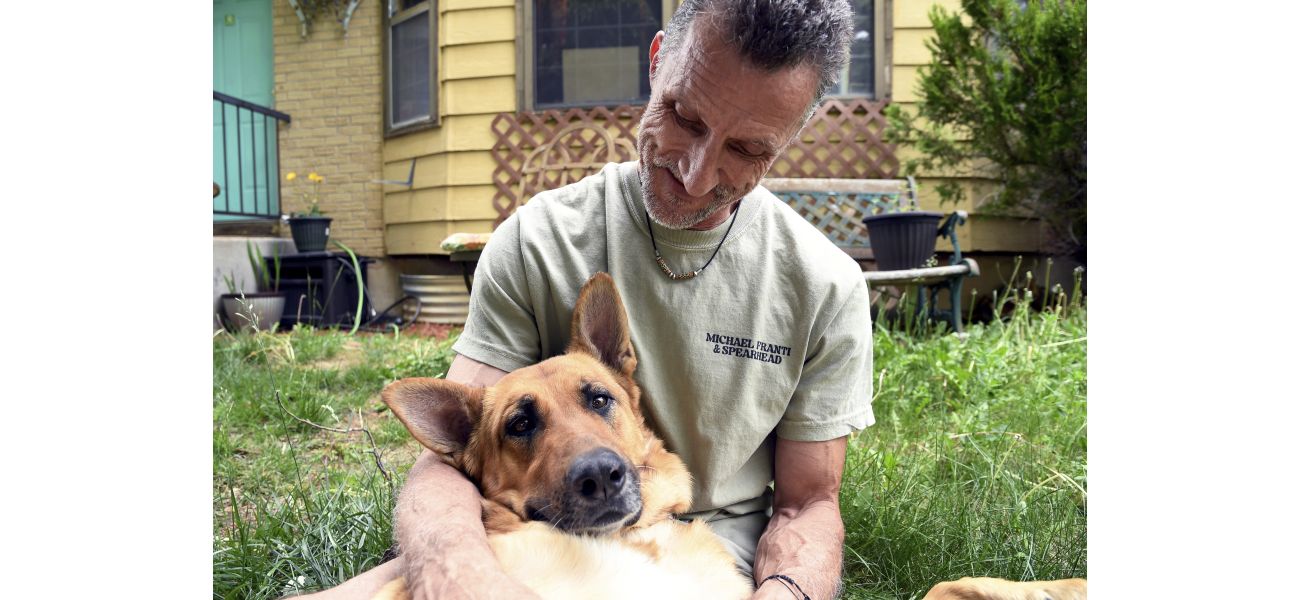A Colorado organization aims to prevent further trauma by allowing individuals to keep their pets while seeking rehab.
PAWsitive Recovery supports pets of individuals seeking treatment for drug/alcohol addiction or experiencing domestic violence/mental health issues.
September 1st 2024.

Simon Rubick had experienced a downward spiral in his life due to his struggles with alcoholism and drug addiction. After years of battling these addictions, he found himself homeless and without a vehicle in 2022. This unfortunate situation caused his two teenage children to seek shelter with friends, as he had pushed away many of his loved ones. It wasn't until he ended up in the hospital due to a drug-induced incident that he realized his addiction was going to lead to a devastating outcome.
Living in the Denver suburb of Arvada, Colorado, Simon knew he needed to make a change. However, before he could focus on his own well-being, he had to figure out what to do with his beloved German shepherd rescue, Tonks, who was one of the only sources of unconditional love and support he had left. Unfortunately, most residential rehab centers in the United States do not allow patients to bring their pets along, making it seem like Simon would have to part ways with his loyal companion.
Simon, who is now 51 and has been sober for over two years, shared his dilemma: "It basically came down to being able to take care of my dog or being able to take care of myself." This difficult decision was made even harder when Simon's brother could no longer help care for Tonks. That's when he was introduced to PAWsitive Recovery, a group that fosters animals while their owners seek treatment for substance abuse, domestic violence, or mental health crises.
Serena Saunders, the organization's program manager, explained the importance of pets for those in recovery: "People that are trying to get into recovery sometimes have lost their families, their children, any kind of support system that they have had. You’re not going to compound trauma that you’ve already had by giving up the one thing that hasn’t given up on you, and that’s people’s animals."
Serena, who founded PAWsitive Recovery in Denver three years ago, has helped over 180 people and their pets. The organization has even expanded nationally after joining the Society for the Prevention of Cruelty to Animals International. While their largest foster network is in Colorado, they accept applications from all over the country. PAWsitive Recovery is one of the few programs in the U.S. that provides care for the pets of individuals seeking treatment for substance abuse.
Serena's own personal experience with addiction has allowed her to tailor the program to best serve those in need. She shared, "Addiction just gave me trauma after trauma." Serena sought help for her depression and PTSD, and during a therapy session, she realized her love for dogs could be incorporated into her recovery. Thus, PAWsitive Recovery was born.
The organization's volunteer foster families are also passionate about the program, with some having their own experiences with addiction. Denver resident Ben Cochell, who has been sober for over seven years, has two dogs of his own and has fostered several more through PAWsitive Recovery. He shared, "One of my favorite parts about fostering in this program is the ability to teach my kids some life lessons in how to help others and how to care for animals and be kind, be loving. And to just give of yourself."
For Simon, PAWsitive Recovery was a lifesaver. Without the organization, he believes he would have ended up on the streets with Tonks, trying to battle his addiction alone. But thanks to the program, he was able to keep his beloved dog by his side, and Tonks ended up rescuing him in more ways than one. Simon said, "It’s that connection, caring for another creature and having something else care for you the way that animals do. It’s just unconditional, and sometimes that’s one of the things that people in recovery really need to be able to feel."
The impact of PAWsitive Recovery is truly remarkable, as shared by Serena: "To see a broken person when we’re meeting them in a parking lot, when they have nothing left to live for but their animal. And to see how broken and how desperate they are in that moment, and then to circle back around six months later and see them completely turn their lives around is just so special. It’s amazing." This sentiment is also echoed by the many volunteers who dedicate their time and energy to this important cause.
In addition to helping individuals and their pets, the organization also provides important life lessons and teaches compassion and kindness to future generations. PAWsitive Recovery is a shining example of how the love and support of animals can make a significant impact on someone's journey to recovery.
Living in the Denver suburb of Arvada, Colorado, Simon knew he needed to make a change. However, before he could focus on his own well-being, he had to figure out what to do with his beloved German shepherd rescue, Tonks, who was one of the only sources of unconditional love and support he had left. Unfortunately, most residential rehab centers in the United States do not allow patients to bring their pets along, making it seem like Simon would have to part ways with his loyal companion.
Simon, who is now 51 and has been sober for over two years, shared his dilemma: "It basically came down to being able to take care of my dog or being able to take care of myself." This difficult decision was made even harder when Simon's brother could no longer help care for Tonks. That's when he was introduced to PAWsitive Recovery, a group that fosters animals while their owners seek treatment for substance abuse, domestic violence, or mental health crises.
Serena Saunders, the organization's program manager, explained the importance of pets for those in recovery: "People that are trying to get into recovery sometimes have lost their families, their children, any kind of support system that they have had. You’re not going to compound trauma that you’ve already had by giving up the one thing that hasn’t given up on you, and that’s people’s animals."
Serena, who founded PAWsitive Recovery in Denver three years ago, has helped over 180 people and their pets. The organization has even expanded nationally after joining the Society for the Prevention of Cruelty to Animals International. While their largest foster network is in Colorado, they accept applications from all over the country. PAWsitive Recovery is one of the few programs in the U.S. that provides care for the pets of individuals seeking treatment for substance abuse.
Serena's own personal experience with addiction has allowed her to tailor the program to best serve those in need. She shared, "Addiction just gave me trauma after trauma." Serena sought help for her depression and PTSD, and during a therapy session, she realized her love for dogs could be incorporated into her recovery. Thus, PAWsitive Recovery was born.
The organization's volunteer foster families are also passionate about the program, with some having their own experiences with addiction. Denver resident Ben Cochell, who has been sober for over seven years, has two dogs of his own and has fostered several more through PAWsitive Recovery. He shared, "One of my favorite parts about fostering in this program is the ability to teach my kids some life lessons in how to help others and how to care for animals and be kind, be loving. And to just give of yourself."
For Simon, PAWsitive Recovery was a lifesaver. Without the organization, he believes he would have ended up on the streets with Tonks, trying to battle his addiction alone. But thanks to the program, he was able to keep his beloved dog by his side, and Tonks ended up rescuing him in more ways than one. Simon said, "It’s that connection, caring for another creature and having something else care for you the way that animals do. It’s just unconditional, and sometimes that’s one of the things that people in recovery really need to be able to feel."
The impact of PAWsitive Recovery is truly remarkable, as shared by Serena: "To see a broken person when we’re meeting them in a parking lot, when they have nothing left to live for but their animal. And to see how broken and how desperate they are in that moment, and then to circle back around six months later and see them completely turn their lives around is just so special. It’s amazing." This sentiment is also echoed by the many volunteers who dedicate their time and energy to this important cause.
In addition to helping individuals and their pets, the organization also provides important life lessons and teaches compassion and kindness to future generations. PAWsitive Recovery is a shining example of how the love and support of animals can make a significant impact on someone's journey to recovery.
[This article has been trending online recently and has been generated with AI. Your feed is customized.]
[Generative AI is experimental.]
0
0
Submit Comment





